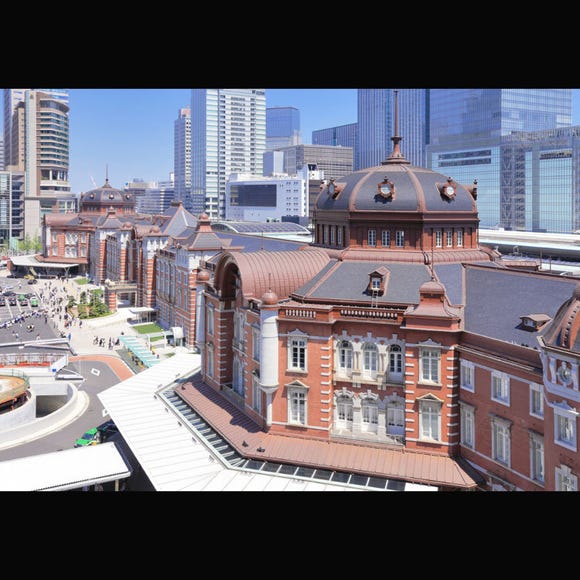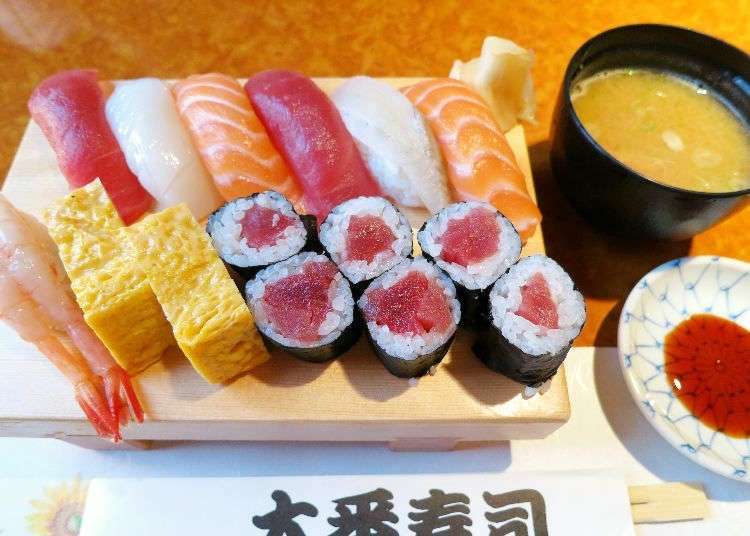
Sushi, by far the most famous and popular food of Japanese cuisine! While sushi comes in many different varieties, most people outside of Japan likely imagine “nigiri” first. The skillful sushi chef shaping the vinegared rice with a few, masterful gestures and placing the neta (topping) on top of it, probably tuna or shrimp – that’s what we see in front of our eyes when we think of sushi, isn’t it? Just watching the masters at work is a mesmerizing experience.
Another image that we tend to have of sushi is that it is upscale and expensive. However, the famous nigiri sushi was actually born as a street snack in Edo (old Tokyo) during the same-named Edo period. That original sushi was made with the fresh seafood caught in today’s Tokyo Bay, sold at food stalls. The people of Edo would stop by, get a piece of sushi and eat it right at the stall, standing, as a filling snack. Sushi back then really was the fast food of the time. Apparently, sushi during the Edo period also was two to three times bigger than today’s sushi!
Enjoying Cheap & Delicious Sushi in Neon-Lit Shinjuku!
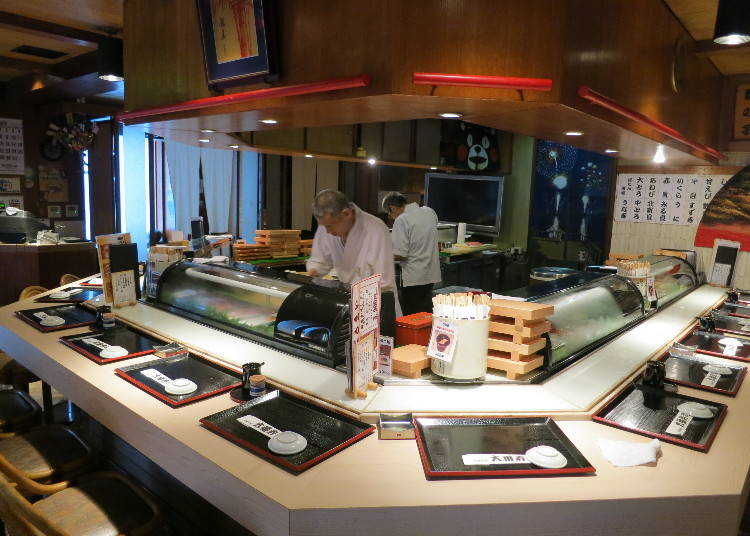
Of course, sushi has gotten a lot more diverse since then and so have the restaurants. In the Michelin Guide, you’ll find luxurious sushi restaurants that are notoriously hard to enter. They all serve exquisite sushi, without a doubt, but their atmosphere doesn’t exactly feel laid-back or beginner-friendly.
On the other side of the spectrum are conveyor belt sushi restaurants called kaiten sushi, a favorite of Japanese families. You’ve surely seen them before – small plates with sushi leisurely sit on a conveyor belt that takes them past the guests who choose their favorites from this predetermined selection. However, there are also many over-the-counter sushi shops that are committed to a welcoming, laid-back atmosphere even without a conveyor.
It’s up to you where you’re going to have your Japanese sushi experience, but we would like to warmly recommend three spots that are especially great choices for tourists while serving master-crafted sushi creations. In fact, major chains of conveyor belt sushi restaurants often have a “sushi robot” in the back that shapes the rice into perfect little beds. While that is neat and not a bad technique at all, handmade sushi by a proper chef is still somewhat different. That’s why we’re taking you to three authentic sushi shops in Shinjuku that offer this “sushi craftsman” experience – for 1,000 yen or less!
1. Oban Zushi Main Store: Sushi at 800 Yen for over 20 Years! An Authentic Sushi Lunch in Kabukicho, the Heart of Shinjuku
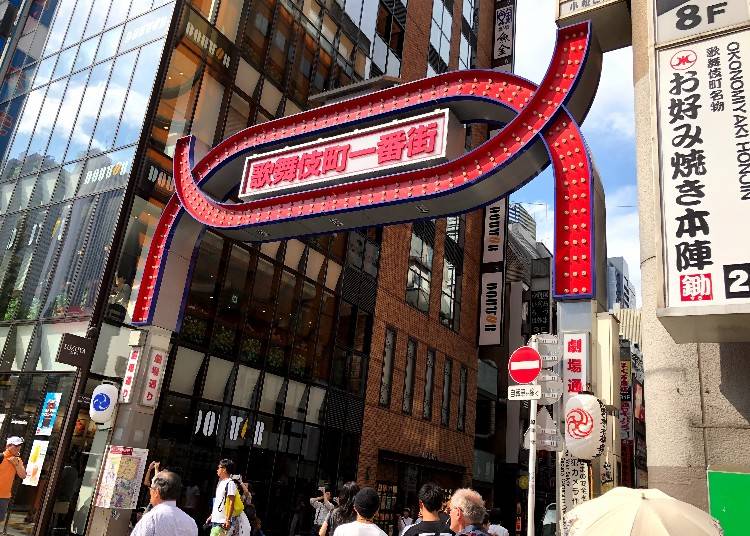
The first sushi shop on our list can be found in Kabukicho, the famous entertainment district right in the heart of Shinjuku. The glitzy neon-lit area is crowded with people, visiting the many restaurants and bars – it’s truly a city that does not sleep.
However, Kabukicho during the day boasts a rather different atmosphere. The Shinjuku Ward Office is also in Kabukicho and the Tokyo Metropolitan Government Building is not far away either. In the morning, you’ll see plenty of regular people going to work and it feels like a business area.
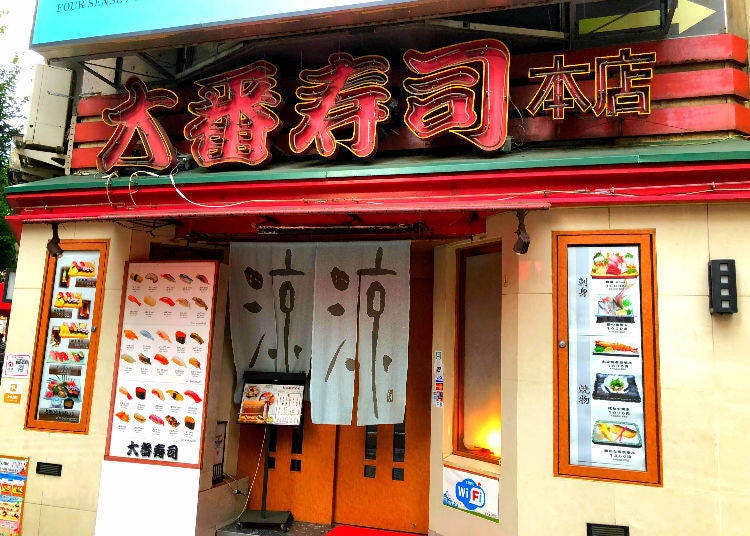
Oban Zushi Main Store is close to the Shinjuku Ward Office, right in the middle of the entertainment district. Founded in 1986, this store’s business hours have remained unchanged from 11:00 a.m. to 6:00 a.m. the next day. It is said that a lot of the shop’s regulars are people working in the entertainment district and recharging their energies after a long night with delicious sushi.
Lunch hours, on the other hand, are crowded with office workers but that wasn’t always the case. In the past, daytime business was rather quiet at Oban Zushi, which is why the shop tried to bring in more people for lunch with their “service lunch” nigiri set for a mere 800 yen. The “chirashi,” which is a bowl of mixed toppings on a bed of vinegared rice, is also highly recommended and available for the same price.
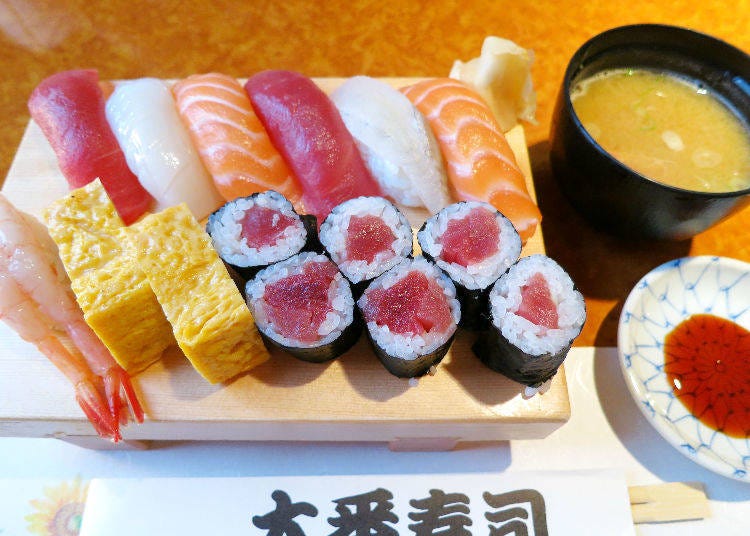
The “service lunch (nigiri plus soup)” for 800 yen. From top left: tuna, squid, salmon, tuna, flounder, salmon. From bottom left: sweet shrimp, fried egg, tekka maki (tuna sushi rolls). The wooden board that the sushi is served on is called “geta” because it looks just like the shoe.
Choice fresh fish is delivered to the restaurant straight from Tsukiji Market every single day. The rice is from the owner’s home area of Kurikoma Kogen in Miyagi Prefecture, chosen because it goes so well with sushi vinegar. Often, you’ll find sushi stores that have a different quality for lunch and dinner time, but Oban Zushi has the same delicious taste all day long. While tuna, shrimp, and salmon are basically offered year-round, the squid and whitefish changes by season. Sea bass and sea bream, for example, are also often featured in the service lunch. The miso soup also contained shrimp heads as we visited, but it apparently also gets its flavor from fish cuts on other days.
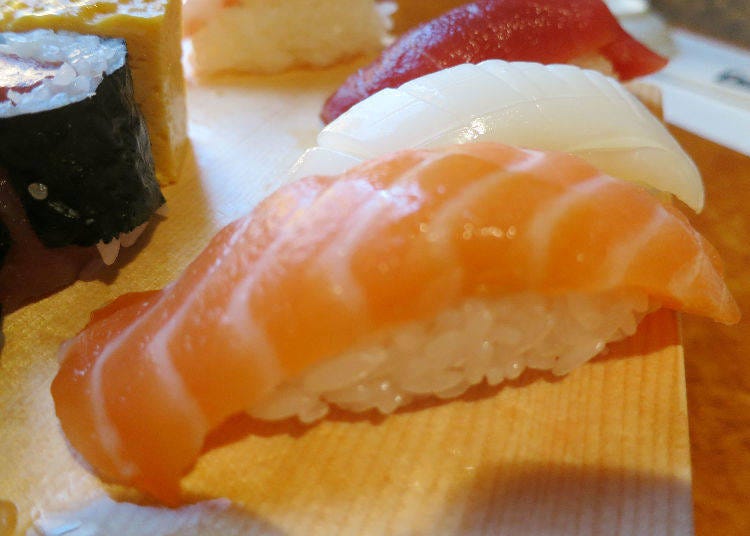
Salmon is the most popular choice of the store’s international visitors. Some even order it with mayonnaise, so don’t hesitate to ask if you have any special preference!
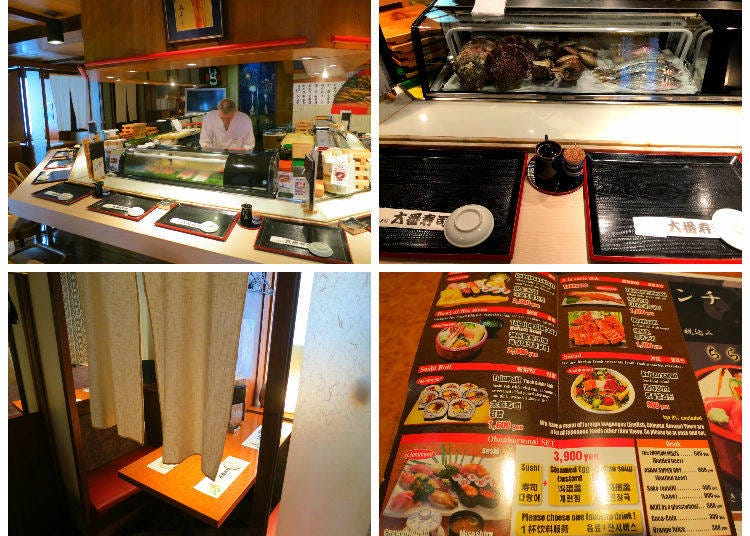
Currently, there are more and more people coming to Shinjuku for either sightseeing or business, so Oban Zushi Main Store is never quiet. The shop also offers an English menu and free Wi-Fi, so take a break, relax, and savor deliciously fresh sushi!
Hours: 11:00 a.m. – 6:00 a.m.
Closed: Sundays (open if Monday is a national holiday; then closed on Monday instead)
-
Oban Zushi Main Store大番寿司 本店
- Address 1-3-11 Kabukicho, Shinjuku-ku, Tokyo, 160-0021 Japan / 〒160-0021 東京都新宿区歌舞伎町1-3-11
-
Nearest Station
JR Shinjuku Station, 10 minutes on foot from West Exit / Shinjuku Station (subway, Marunouchi Line), 5 minutes on foot from Exit B10
- Phone Number 050-3476-9787
2. Oedo Shinjuku West Entrance: 160 Yen per Plate at a Fantastic Conveyor Belt Sushi Restaurant
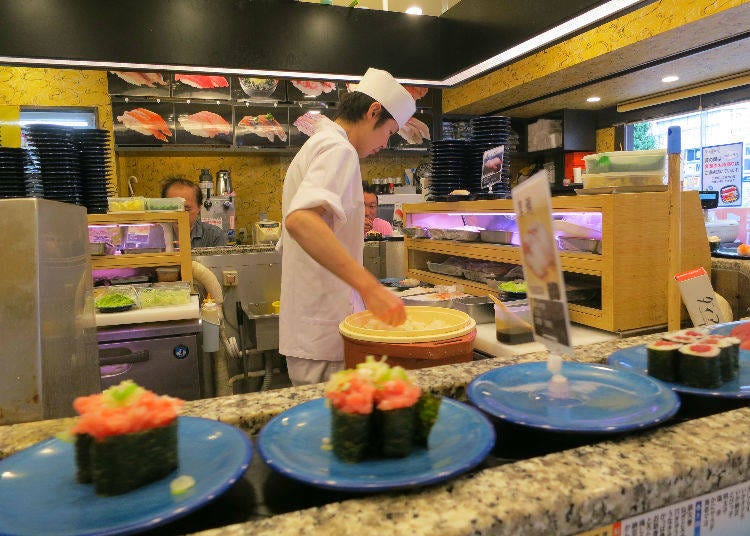
Conveyor belt sushi is an integral part of Japanese sushi culture. Everyone is familiar with the sight of plates full of deliciousness moving on a belt, either from first-hand experience or from TV and internet.
Recently, sushi robots have become popular at these conveyor belt restaurants and there are more and more such spots that offer their sushi for 100 yen per plate. Not all, however – at Oedo in Shinjuku, skilled craftsmen put all their knowledge and skill into making every single sushi creation by hand.
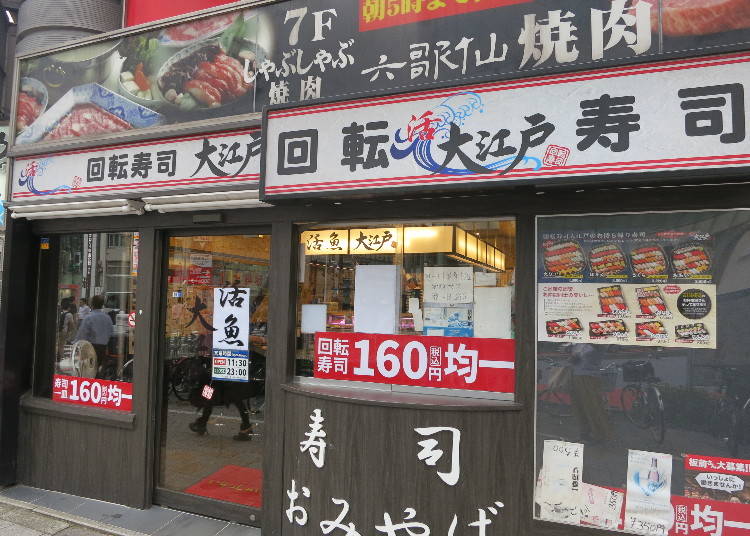
The sushi shop opened in 1985 with the simple yet wonderful concept of “serving delectable sushi for reasonable prices.” Currently, Oedo has 15 locations throughout Tokyo that cater to a wide range of people with plates for 130 yen to 160 yen. This time, we visited the Shinjuku West Exit location not far from the station where every plate goes for 160 yen.
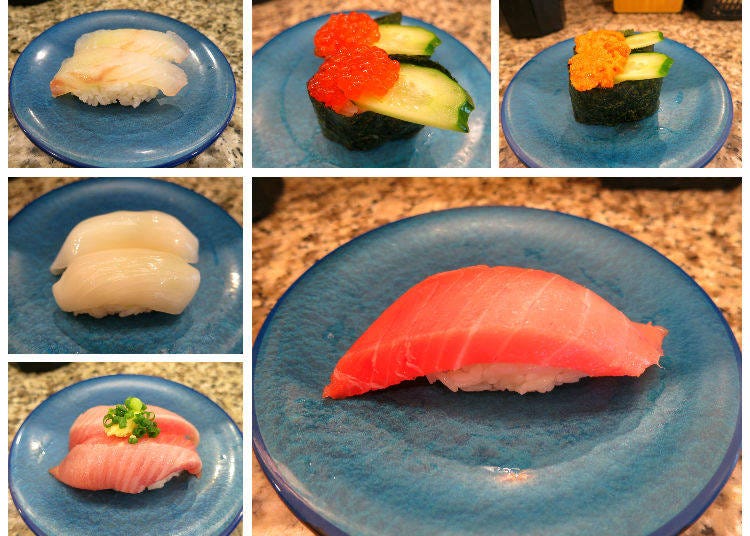
We had six plates for our visit. From sea urchin to salmon roe, every sushi delicacy is 160 yen, so we ended up with a bill of 960 yen in total. One plate features two pieces of nigiri sushi except for the medium-fatty tuna which comes as a single piece, meaning that we had a total of 11 nigiri. That’s quite a satisfying amount and even the solo tuna was well worth its money, as the fattiness made it quite literally melt on our tongue!
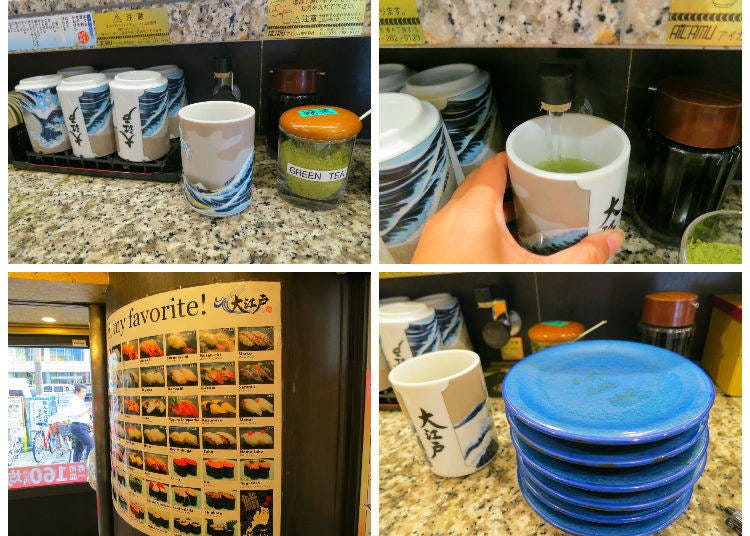
Conveyor belt sushi has a couple of unique rules. There are cups called yunomi on the counter, which you can freely take to enjoy free green tea. First, put a bit of tea powder in your cup, then place it underneath the little tap. Push the button near your seat and hot water is poured directly in your cup for freshly brewed tea!
It’s also custom to pile up your empty plates next to you, letting the staff check the number of plates and their color at a single glance to calculate the price.
Hours: 11:30 a.m. – 11:00 p.m.
Closed: open every day
-
Oedo Shinjuku West Entrance大江戸 新宿西口店
- Address Shinjuku Sunflower Bldg., 1-3-1 Nishi-shinjuku, Shinjuku-ku, Tokyo, 160-0023 Japan / 〒160-0023 東京都新宿区西新宿1-3-1 新宿サンフラワービル
-
Nearest Station
JR Shinjuku Station, 6 minutes on foot from West Exit/Shinjuku-Nishiguchi Station (Toei Oedo Line, loop section), 1 minutes on foot from Exit D4
- Phone Number 03-3342-8028
3. Sushi Bar Nigirite: Reasonable Sushi Lunch during the Day, Aged Sushi at Night!
Last but not least, we visit Sushi Bar Nigirite at Shinjuku Station’s West Exit. In the beginning, this sushi shop was a standing bar, but the only quickly realized that people do want to sit down and enjoy their sushi delicacies slowly and changed the concept of the shop. Currently, only the signboard remains of the standing bar days.
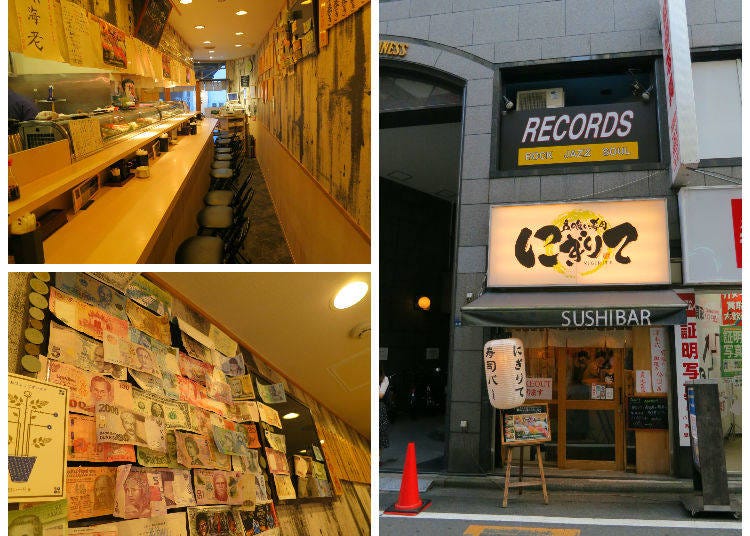
Sushi Bar Nigirite’s concept is “enjoying reasonably priced sushi at the counter.” There are three different lunch sets on the menu that cost less than 1,000 yen, with the most reasonable being the “sampling lunch” for a mere 500 yen and includes 6 nigiri sushi and one temaki (hand-rolled sushi cone).
The “seasonal lunch” for 780 yen is also fantastic, boasting ingredients of the season arranged in 8 nigiri sushi and one temaki. The most filling option is the “1.5 servings lunch” for 900 yen with 12 nigiri sushi and one temaki, also offering the most variety when it comes to toppings.
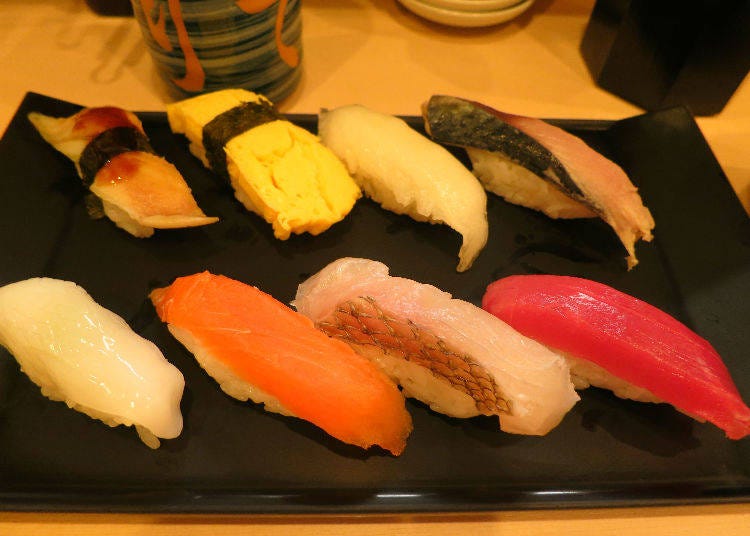
We went for the “seasonal lunch” for 780 yen. The two rows of nigiri sushi, eight in total, look amazing and the miso soup that comes with the lunch adds an extra kick of flavor. How can this lunch be so cheap? It’s a simple question that the owner and chef Keiichi Tsuchiya has an equally simple answer to: “Because I want to offer it this cheaply.”
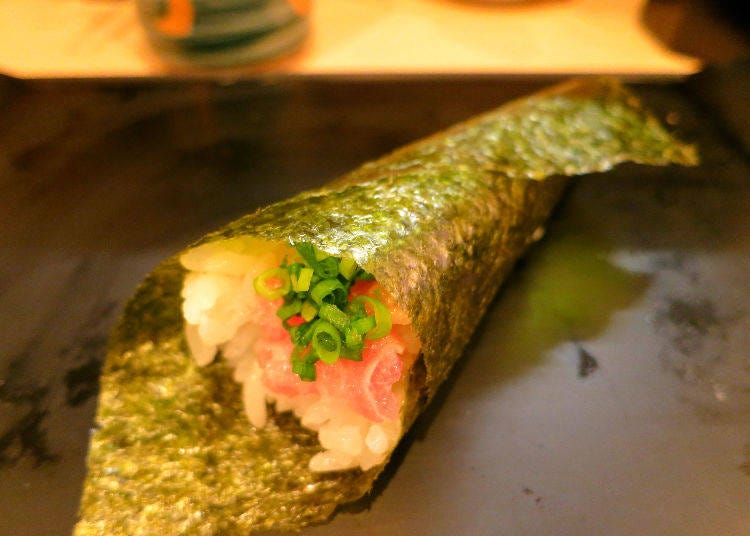
Right after savoring all eight nigiri creations, the temaki sushi was served – impeccable timing and customer service!
By the way, one of the things that had a big influence on Mr. Tsuchiya opening his shop was the international tourists visiting the sushi restaurant where he trained. He got to witness the excitement and surprise that simple sushi created, so he decided that he wanted to “make Japanese people who have grown up with sushi feel that kind of surprise and excitement that international guests feel.”
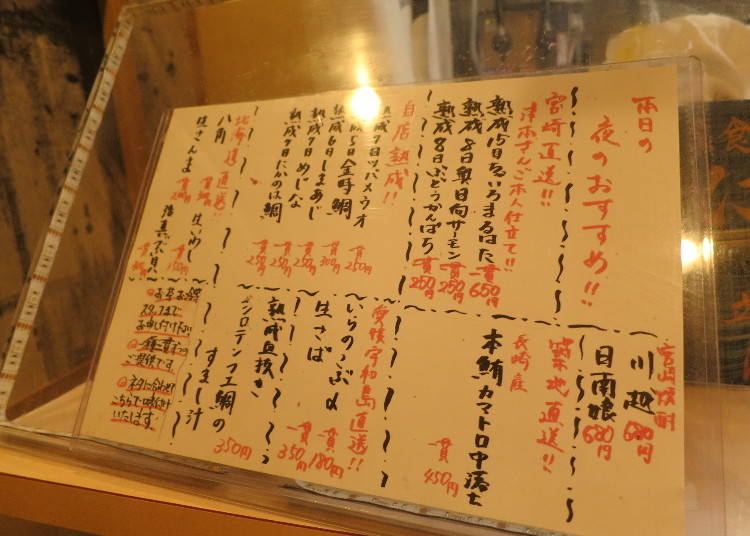
That’s why he offers aged sushi during the evening to “offer this surprise and excitement” to his diners, as he says. He uses a technique called “Tsumoto-style thorough bleeding” to remove all the blood from the fish to age it before serving it on sushi rice. It might seem like a strange style at first, but from 250 yen per serving, it’s a very reasonable gourmet experience that you shouldn’t miss out on!
Hours: 11:30 a.m. – 3:00 p.m. / 5:30 p.m. – 11:00 p.m.
Closed: Sundays
-
Sushi Bar Nigirite寿司 Bar にぎりて
- Address Daikanpuraza Bldg.1F, 7-9-15 Nishishinjuku, Shinjuku-ku, Tokyo, 160-0023 Japan / 〒160-0023 東京都新宿区西新宿7-9-15 ダイカンプラザビル1F
-
Nearest Station
JR Shinjuku Station, 6 minutes on foot from West Exit /Shinjuku-Nishiguchi Station (Toei Oedo Line), 2 minutes on foot from Exit D5
- Phone Number 03-6908-5178
*Prices and options mentioned are subject to change.
*Unless stated otherwise, all prices include tax.
Popular Tours & Activitiess
Recommended places for you
-
Ad

Japan’s Land of Yokai Monsters and Spooky Stories! A Deep Journey to Mysterious San’in (Tottori & Shimane) for Seasoned Travelers
-
Ad

5 Recommended Wagyu Yakiniku Restaurants in Tokyo: Signature Dishes, Premium Beef, and Secret Sauces
-

Where to Buy a Japanese Kitchen Knife? Why Travelers Choose MUSASHI JAPAN's 14 Stores in Tokyo, Kyoto, and Nara
by: Guest Contributor
-

Top 3 OSHI MAPs for the Best Matcha and Sweets in Tokyo
by: Guest Contributor
-
Ad

What Makes Japanese Yakiniku So Darn Good? Guide to Cuts, Heat, and Wagyu Know-How
-

To the Holy Land of Kawaii! Odakyu Tama Center Station Is Becoming a Dreamy Sanrio Wonderland
by: Guest Contributor
-

Autumn in Japan 2026: Fall Foliage Forecast & Where to Enjoy the Colorful Leaves (+Tour Info)
-

Tokyo Tsukiji|Tsukiji Area Map & Sightseeing Information
-

Healthcare in Japan for Tourists: What to Do When You Get Sick or Injured in Japan
-

Dream Ramen Alert! Tokyo's Top 3 Ramen Shops Near Ikebukuro Loved by Locals
-

Inside Harajuku Takeshita Street: Why is This Place Known as Tokyo's 'Teen's Holy Land'?
-

Tokyo has a bar that only lets you in if you come alone – No bringing your friends allowed!
- #best ramen tokyo
- #what to buy in ameyoko
- #what to bring to japan
- #new years in tokyo
- #best izakaya shinjuku
- #things to do tokyo
- #japanese nail trends
- #what to do in odaiba
- #onsen tattoo friendly tokyo
- #daiso
- #best sushi ginza
- #japanese convenience store snacks
- #best yakiniku shibuya
- #japanese fashion culture
- #best japanese soft drinks


















